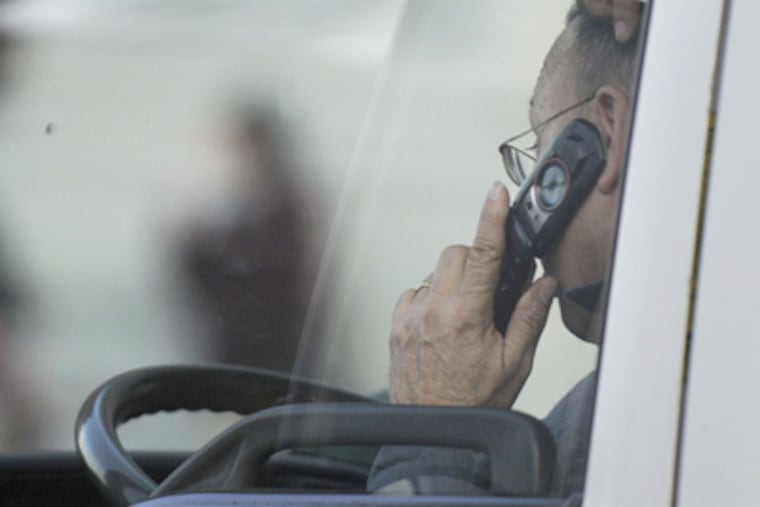Daniel Rubin: New state law trumps Philadelphia's ban against phoning while driving
Could it be that after two years and 29,418 citations, Philadelphians are learning not to drive with cellphones pressed to their ears?

Could it be that after two years and 29,418 citations, Philadelphians are learning not to drive with cellphones pressed to their ears?
Rich Shnitzler thinks he's got the numbers to prove it.
He's a semiretired urban planner who conducted a street-corner survey for me in July 2009, when the city's ban on handheld phones was fresh on the books. His daughter had just obtained her learner's permit, and he was worried.
Over five days, Shnitzler stood curbside at 20th and Hamilton, classifying drivers' behavior as they pulled to a stop.
His findings: one in seven drivers held the wheel in one hand and a phone in the other.
In the 30 months since, Philadelphia police have been handing out citations that run from $150 for the first offense to $300 for unrepentant yakkers.
Shnitzler was happy to repeat his survey last week. His sense that we're putting ourselves at great risk by allowing any phone conversations behind the wheel - including hands-free - has just been affirmed by the National Transportation Safety Board, which this month recommended banning all nonemergency phones for drivers.
Over five weekdays, Shnitzler repeated his method, watching drivers in five batches of 100, during the morning and afternoon rush. The results? "Remarkable," he said. "It was actually boring."
Only one in 10 motorists held a phone while driving.
Shnitzler, who's offered expert testimony in court and before City Council, calls that a huge difference, evidence that public education and fines have made the city safer.
Just in time for the ban on handheld cellphones to disappear.
Buried in the cheers over the Pennsylvania legislature's decision last month to ban texting was the news that the state law specifically preempts the city's ordinance.
Come March 8, Philadelphians will be free to drive one-handed again.
There's no telling whether City Councilman Bill Green will have calmed down by then. He was the author of the city ban on handhelds and grouses that the new no-texting law will prove impossible to enforce.
"There's no way a policeman is going to be able to prove you weren't dialing a number if he sees you [tapping your phone]. Can you check your e-mail? How about look at MapQuest? Yes, you can. The whole thing about the Philadelphia law was that if you were holding your phone in your hand, you were in violation. Any other rule is meaningless."
The councilman said the cellphone industry actively lobbied against Philadelphia's ordinance and "was totally in favor of the new law, which will allow them to continue to make money while people are on the road."
If telecom companies lobbied for getting rid of the hands-free language in state legislation, they did so furtively.
"There was no lobbying against the bill from the industry," said State Rep. Josh Shapiro, the Montgomery County Democrat who spent six years trying to ban texting and handheld phones.
Opposition, he said, came from "a few rural members who did not want to see government play that role in people's lives."
That means legislators like Mike Folmer, a Republican from Lebanon County, who last month told reporters "we don't need another nanny bill to be passed to make us feel better."
Green says legislators who are proud of the new state law are missing the big picture. "They've done just what the industry asked them to, which essentially means it won't lose any billable minutes while people are commuting."
Shapiro disagrees. "At the end of the day," he said, "the bill we passed is going to save lives in Pennsylvania and address the most serious distraction on roadways, and that is texting while driving."
Why did the state's small step have to undo the city's leap? Some lawmakers argued that getting rid of Philadelphia's extra protection gave the rules a tidy uniformity.
And here I thought it was just good electoral politics by those who hate Philadelphia - population control.